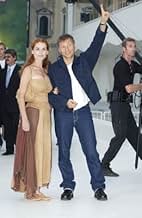It's easy to miss what DUST does with the Western's clichés. The movie is a kind of rumination in modern, international terms on THE WILD BUNCH, with some problems (e.g., Joseph Fiennes's Southern accent and arguably too many bloodbaths) and with some remarkable achievements. Chief among these is Manchevski's managing to keep several threads hanging because he pays us the compliment of assuming that we are paying attention, waiting for culmination, like the youngster who finally proves to be the movie's protagonist. We need very few details to make the important connections. The lad is a low-class thief in hock to dirty cops; he confronts an old broad far tougher than he is, who sees his resemblance to the Luke of her memory, a mercenary cowboy who found it easier to kill than love. As she begins a sharp-witted decline to death, she tells Luke's story. The story is full of traps. We think Luke fled to Macedonia because he loves the prostitute his sinister, found-again brother (Fiennes) has married. But Luke and his life are more complicated than that, as we gradually learn, circling through past, present, and the minds of several participants. Manchevski values images, cutting to the old lady's photos from the past, mixing times and spaces within the frame. He insists that we are watching the old lady's story, not even a pretense at reality. At last the youngster takes up the challenge and Luke redeems himself in a final confrontation whose truth is in fiction's need to resolve the central issue: here, that memory is a story which makes time come round to emphasize the dark ironies and pains from which we keep trying to protect ourselves.
































